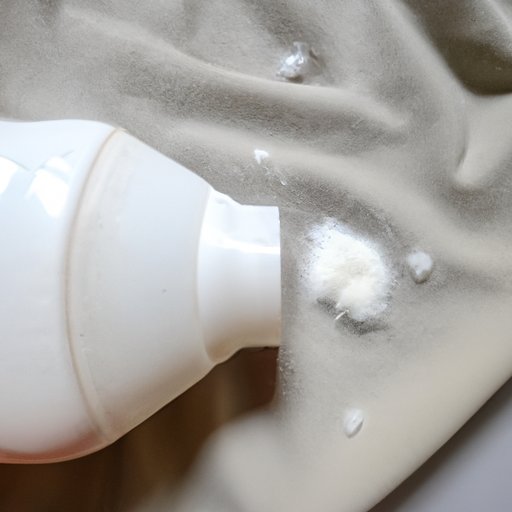Introduction
Fabric softener is a popular product used in laundry that helps make clothes softer, reduce static cling, and add a pleasant scent. But does it actually ruin your clothes? In this article, we’ll explore the effects of fabric softener on clothing, common signs of damage caused by fabric softener, and alternative ways to soften your laundry.

Examining the Effects of Fabric Softener on Clothing
First, let’s take a look at what causes damage to clothes. The most common culprits are heat, chemicals, and abrasive surfaces. Heat can cause fabrics to shrink, fade, and weaken fibers. Chemicals, such as bleach, can also weaken fibers and cause colors to fade. And abrasive surfaces, like sandpaper, can cause pilling and snagging.
So how does fabric softener affect clothing? Fabric softeners are made up of chemicals that coat the surface of fabrics and help reduce static cling. However, these chemicals can also leave behind a residue that can weaken the fabric over time. This residue can also attract dirt, dust, and other particles, which can clog the fabric and make it harder to clean.
Is Fabric Softener Ruining Your Clothes?
Now let’s talk about common signs of damage caused by fabric softener. If you’ve noticed that your clothes are feeling stiffer or less comfortable than usual, it could be a sign that fabric softener is damaging the fabric. You may also notice that colors are fading or that fabrics are becoming weaker.
If you’re concerned that fabric softener may be damaging your clothes, there are tests you can do to check for damage. One way to test for fabric softener damage is to rub two pieces of fabric together. If the fabrics feel sticky or gummy, it could be a sign that fabric softener has left a residue on the fabric.
The Pros and Cons of Using Fabric Softener
Now let’s take a look at the pros and cons of using fabric softener. On the plus side, fabric softener can help reduce static cling and make clothes softer and more comfortable. It can also add a pleasant scent to your laundry. On the downside, using too much fabric softener can leave a residue on fabrics that can damage them over time.

How to Maintain Clothes Without Fabric Softener
If you’d like to avoid using fabric softener, there are some steps you can take to keep your clothes looking their best. First, make sure to use the correct amount of detergent when washing your clothes. Too much detergent can leave behind a residue that can weaken fabrics. Second, use cold water when washing delicate fabrics like wool or silk. Hot water can shrink and weaken these fabrics.
Finally, consider air drying your clothes instead of using a dryer. Air drying can help preserve the shape and color of your clothes, and it can also help reduce static cling. You can also use a few drops of essential oil in the wash cycle to add a pleasant scent to your clothes.
What You Need to Know About Fabric Softener and Clothes
It’s important to understand the difference between fabric softener and detergent. Detergents are designed to clean fabrics, while fabric softeners are designed to soften and add a pleasant scent. Knowing when to use fabric softener is key to keeping your clothes looking their best. If you’re washing delicate fabrics or dark colors, it’s best to skip the fabric softener altogether.

Alternatives to Fabric Softener for Softening Laundry
If you’d like to avoid using fabric softener, there are some natural alternatives you can try. Vinegar is one of the most popular options. Just add a cup of white vinegar to the rinse cycle to help soften your clothes. Baking soda is another great option. Add 1/2 cup of baking soda to the wash cycle to help soften your clothes and reduce static cling.
There are also other products you can use to soften laundry, such as wool dryer balls, which help fluff and soften fabrics in the dryer. You can also add a few drops of essential oils to your dryer balls for a pleasant scent.
Conclusion
In conclusion, fabric softener can be a great way to reduce static cling and add a pleasant scent to your laundry. However, if you’re not careful, it can also damage your clothes over time. To avoid fabric softener damage, make sure to use the correct amount of detergent, use cold water for delicate fabrics, and air dry your clothes whenever possible. You can also try natural alternatives like vinegar and baking soda, or other products like wool dryer balls.
By understanding the effects of fabric softener on clothing and knowing when to use it, you can keep your clothes looking their best for longer. So next time you do laundry, make sure to think carefully about whether fabric softener is the right choice for your clothes.


